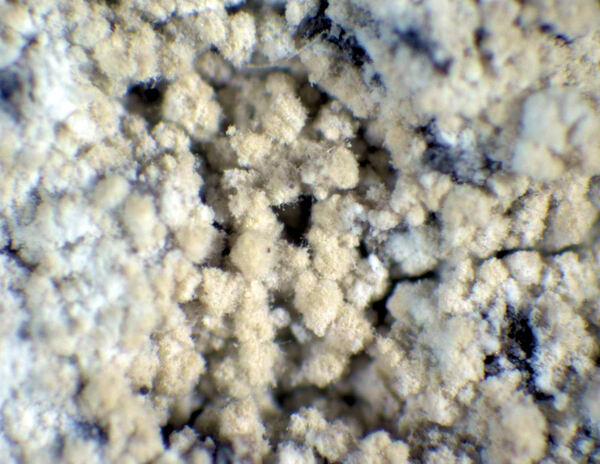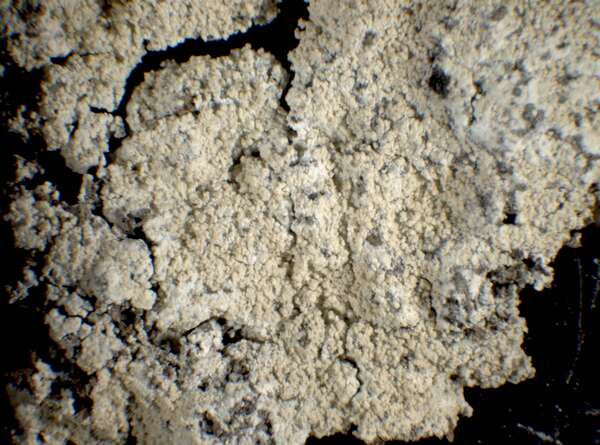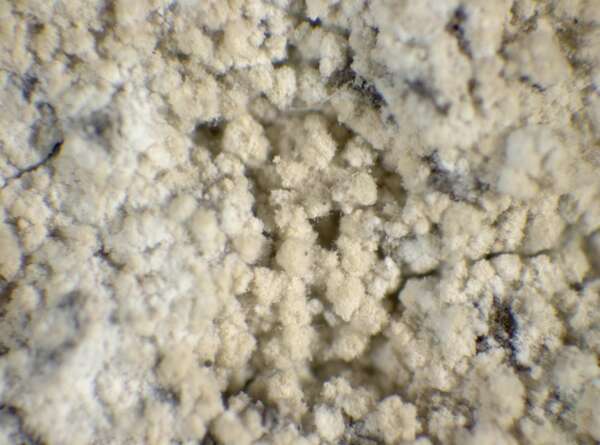Lepraria diffusa (J.R. Laundon) Kukwa
Ann. Bot. Fenn., 39: 226, 2002. Basionym: Leproloma diffusum J.R. Laundon - Lichenologist, 21: 16, 1989.
Synonyms:
Description: Thallus leprose, consisting of a soft mass of soredia-like granules, whitish to usually cream-coloured, sometimes clearly yellowish, usually poorly delimited, always without lobes and without a raised edge. Granules coarse, (80-)100-200(-280) μm in diam., sometimes with short projecting hyphae. Medulla white, very poorly developed to absent. Photobiont chlorococcoid. Spot tests: K- or K+ yellow slowly turning dirty orange, C- or C+ dirty orange, KC- or KC+ yellow to dirty orange, P+ yellow-orange to brownish red, UV-. Chemistry: 4-oxypannaric acid 2- methylester (major), 4-oxypannaric acid (minor to trace), pannaric acid methylester, pannaric acid 2-methylester, pannaric acid and other dibenzofurans (traces).
Growth form: Leprose
Photobiont: green algae other than Trentepohlia
Reproductive strategy: mainly asexual, by soredia, or soredia-like structures (e.g. blastidia)
Commonnes-rarity: (info)
Alpine belt: absent
Subalpine belt: very rare
Montane belt: rare
Dry submediterranean belt: absent
Humid submediterranean belt: rather rare
Padanian area: absent
pH of the substrata:
1 2 3 4 5
Solar irradiation:
1 2 3 4 5
Aridity:
1 2 3 4 5
Eutrophication:
1 2 3 4 5
Poleotolerance:
0 1 2 3
Altitudinal distribution:
1 2 3 4 5 6
Rarity
absent
extremely rare
very rare
rare
rather rare
rather common
common
very common
extremely common
Loading data...
Occurrence data
Predictive map
Growth form: Leprose
Photobiont: green algae other than Trentepohlia
Reproductive strategy: mainly asexual, by soredia, or soredia-like structures (e.g. blastidia)
Commonnes-rarity: (info)
Alpine belt: absent
Subalpine belt: very rare
Montane belt: rare
Dry submediterranean belt: absent
Humid submediterranean belt: rather rare
Padanian area: absent
pH of the substrata:
| 1 | 2 | 3 | 4 | 5 |
Solar irradiation:
| 1 | 2 | 3 | 4 | 5 |
Aridity:
| 1 | 2 | 3 | 4 | 5 |
Eutrophication:
| 1 | 2 | 3 | 4 | 5 |
Poleotolerance:
| 0 | 1 | 2 | 3 |
Altitudinal distribution:
| 1 | 2 | 3 | 4 | 5 | 6 |
Rarity
absent
extremely rare
very rare
rare
rather rare
rather common
common
very common
extremely common
Loading data...
Occurrence data
Predictive map









